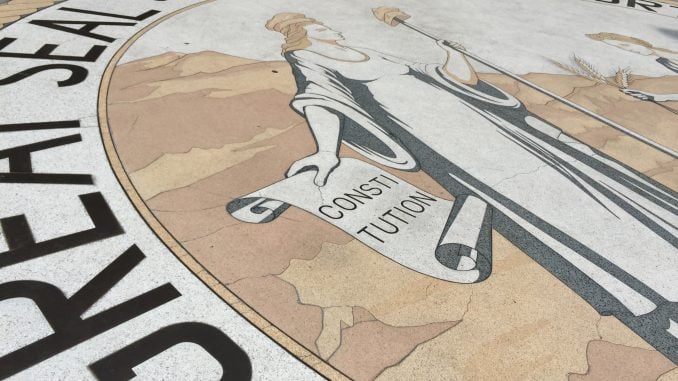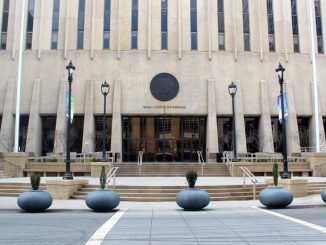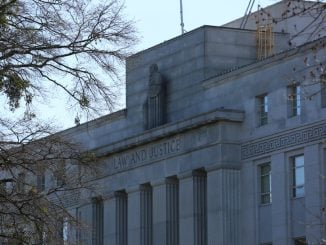
RALEIGH — In the final days of 2022, the decades-old Leandro education case was reassigned again.
On Dec. 29, Chief Justice Paul Newby issued an order reassigning the case to the “Honorable James F. Ammons, Jr., one of the Senior Resident judges of the Superior Court of North Carolina.”
Ammons currently serves in District 12C of the 3rd Superior Court Division. He was elected to that role in 2018 as an independent and his current term will end on Dec. 31, 2026.
Newby’s reassignment order honors a Nov. 30, 2022, reassignment request made by Business Court Judge Michael Robinson. Newby had appointed Robinson to oversee the case in March 2021.
In his letter, Robinson revisited the more recent events in the case and noted the likely event of continued oversight.
“Given the procedural history of this litigation, now in its 27th year, it is likely that the continuing oversight by the assigned Superior Court Judge will require extensive periodic hearings for the foreseeable future,” Robinson wrote.
Robinson also cited his workload demands and the complexity of the case in asking for the case to be reassigned.
“I write you to respectfully request that, if I am still considered the presiding Superior Court judge in this matter, that the matter be re-assigned to another Superior Court Judge. Given my workload and the demands of my docket as a Business Court Judge, it will be difficult to maintain oversight and jurisdiction over this case without the reassignment of some of my cases to my Business Court colleagues, each of whom already has a full docket and heavy workload,” wrote Robinson.
Prior to the case being reassigned to Ammons, an affidavit on the fund transfer amount from the Office of State Budget and Management (OSBM) was submitted by Chief Deputy Director of the State Budget Anca Elena Grozav.
The N.C. Supreme Court in its 4-3 Nov. 4 ruling ordered a recalculation of how much funding is outstanding. The ruling applies to the second and third years of the Comprehensive Remedial Plan (CRP), which originally included spending totaling $1.75 billion. Now-retired Associate Justice Robin Hudson penned the majority opinion, which remanded the case back to the trial court for the “narrow purpose of recalculating the amount of funds to be transferred in light of the State’s 2022 budget.”
The dollar figure submitted by Grozav and OSBM is around $677.8 million. That’s roughly $108.8 million less than the total submitted by Robinson last year.
“The analysis reveals that 63% of the Year Two Action Items of the Comprehensive Remedial Plan, and 60% of the Year Three Items of the Comprehensive Remedial Plan have been funded. This means that approximately $257,679,390 of Year Two Action Items remain unfunded, while $420,121,777 of Year Three Action Items remain unfunded,” Grozav’s Dec. 19 affidavit reads.
The case will likely see continued adjustments to the funding figure as the General Assembly hammers out a new state budget in the upcoming long session.
An earlier filing in the case made on Dec. 12 was a report outlining the timeframe for action.
The report is only a few pages long and includes an agreed-upon proposed schedule giving all parties until Jan. 20 to respond to the OSBM affidavit. Additionally, the report underscores the opposition to the schedule by State Controller Linda Combs, who believes there needs to be “additional procedures” in place before any transfer happens.
In November 2021, Judge David Lee issued an order directing the State Controller’s Office, the Office of Budget and Management, and the N.C Treasurer to transfer $1.7 billion from the state’s treasury. Lee’s order also dictated the funds are to be distributed to the N.C. Department of Health and Human Services, the N.C. Department of Public Instruction, and the UNC System.
Combs has already objected to being brought into the case as that office has had no part in long-running proceedings whatsoever up until Lee issued his transfer order. Both in a past motion filing and during oral arguments before the state Supreme Court, the controller and the attorney representing them have argued Combs has no legal authority to make such a transfer.
On Jan. 5, the State Board of Education approved a consent agenda motion that included a separate motion requesting that the General Assembly and Democratic Gov. Roy Cooper to “support full implementation” of the Leandro Comprehensive Remedial Plan.
The resolution says the state board of education will consider funding to be directed to Career Pathways and Teacher Licensure Reform (Pilot Phase), EC Funding Formula, and the new and/or revised District and Regional Support Model.
The dollar amount is not listed in the board’s approved resolution, but based on OSBM’s filing, the CRP’s Plan Years Two and Three calls for $1,522,053,000 in total with the current “underfunded” portion standing at $509,701,707.
The 300-page CRP was compiled by WestEd and originally called for $8.29 billion in new state-level education spending over an eight-year period. WestEd’s CRP also estimated another $3.87 billion per year coming in from the federal government over that time.
WestEd was paid roughly $2.05 million to produce the CRP. Around $1.5 million of that total was paid by entities friendly to the governor’s office. A combined $804,699 came directly from two of Cooper’s cabinet agencies — the Department of Administration and the N.C. Department of Health and Human Services.
The dollar amount proposed by WestEd has since been reduced several times since it was first published in March 2021.
After being assigned to the case in late March 2022, Robinson held a set of hearings and received budget data before issuing a 26-page order in late April 2022. Robinson concluded that the most recently passed budget did impact WestEd’s CRP, reducing the amount to be funded for years two and three to around $785 million. By July, a new budget for the 2022-23 fiscal year was approved, impacting Robinson’s initial figure.
The N.C. Supreme Court’s Democratic majority issued its ruling just days before the 2022 midterm general election when the court’s makeup would switch from a 4-3 Democratic majority to a 5-2 Republican majority.
The 4-3 ruling down party lines issued on Nov. 4 ordered a recalculation of outstanding funding. The majority opinion spent much of its time justifying allowing the three state entities named in Lee’s order to make a transfer in opposition to the state constitution’s appropriation authority which bestows that power only on the General Assembly.


